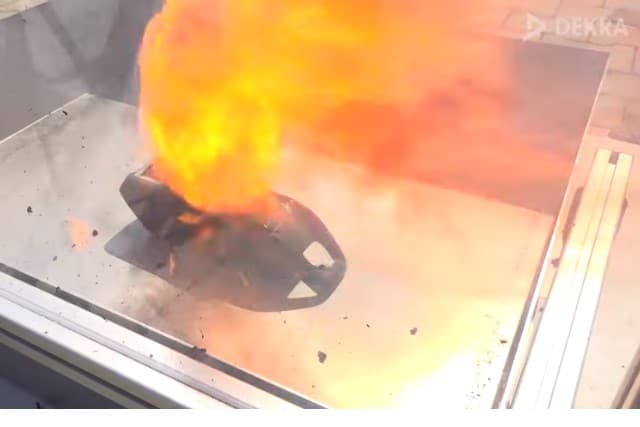In some rare condominiums in the USA and in Europe ebikes are forbidden because they could allegedly catch fire. Let’s delve into that matter.
Lithium ion batteries can catch fire, although very seldom
Several incidents have been reported around the globe. That notwithstanding, if we compare their number with millions of ebikes circulating in every big country, we can consider them isolated cases. In 2022, in New York alone, six people died in different condos, and 76 were injured because of fires started by ebike batteries. Consequently, parking any ebike, be it in the garage, in the cave or in your apartment, is forbidden in some condos worldwide. Lithium-ion batteries can explode, catch fire, or exhale toxics gases. Nevertheless, we deem that high quality batteries, like those from Bosch, Shimano, Yamaha, Fazua, TQ, Giant, Brose, Mahle just to name a few, hardly ever catch fire, although the battery brand has seldom been specified in case of accident.
Let’s put things into perspective
For instance in Germany, there are 7.1 million ebikes. There have been so far very few cases of fires caused by ebike batteries; you could count them on your fingers. In 2021, there were 75 such incidents in New York, and 130 in London, almost all of them injuring people, more or less severely, and three of them were lethal in New York. Measures should be taken to prevent such incidents, nevertheless the danger looks a little overrated. When a new technology starts spreading fast, people become curious and also a bit suspicious. Media know that reporting incidents of ebike battery caused fires generates a good audience, so they have a tendance to emphasize the scope of such incidents, dramatizing the issue. For instance, Teslas catching fire has become a cliché, regardless of the US motorway fire department statistics, stating that every billion kilometers driven, 90 internal combustion cars catch fire, versus only two electric cars. The public perception is that electric cars can catch fire, whereas they are 45 times less likely to burn than traditional cars.

PowerMore 250 Range Extender from Bosch
Ebike and lithium ion batteries scope of the ban is rather wide
Ebikes and lithium ion batteries are not allowed to be transported by air, unless they are carried by special aircrafts without passengers, what costs a fortune, more than 600 dollars to cross the ocean carrying a 2 kilos battery to be delivered oversea. Several railway companies or national train services forbid boarding of ebikes, e-scooters and lithium ion batteries altogether. Bus companies such as Flixbus, Europe’s number one, refuse to carry ebikes on their vehicles.
Why do lithium ion batteries explode, catch fire or exhale toxic gases?
These batteries have an extremely high energy density, that can easily become thermic energy. The electrolytes feed the fire with their oxygen. It is a kind of chain reaction that takes place in a few seconds. The causes are always the same:
- mechanical damage, like that resulting from shock or fall
- overheating, for instance because of prolonged exposure to strong sunrays, in hot temperatures, followed by a long charge
- charging a swollen battery
- charging a battery that remained idle and completely discharged for several days
- thermic shock: we wouldn’t charge a battery that has a below zero temperature, before bringing it to room temperature
- cheaper batteries: they can be dangerous, we’d buy only established brands batteries
How to prevent lithium ion batteries from catching fire
- Use only the charger provided by the battery manufacturer
- Charge it in the garage, on the terrace or balcony, preferably on fireproof floor, like tiles, in a dry place, with a temperature neither too cold nor hot
- Don’t charge your battery at night or when you’re away. Your presence in the house should be enough to avoid dramatic incidents.
- If your battery is damaged or swollen, don’t use nor charge it anymore
- Regularly check it out for leaks, bumps, swells, charging problems or unusual heating
- Ideally, charges should go from 30 to 80%, any charge level below or over those values can be more or less damaging for the battery, hence more likely to cause fires
- Never store it fully charged, and consider using a flame-retardant battery storing bag.
What should you do if your battery catches fire
Before catching fire, a battery starts overheating and emitting smoke. Extinguishing takes a lot of water, if possible sand. This video from Dekra, a car security expert company, should be useful:
Hopefully, effective remedies will be found
The inflammable nature of lithium ion batteries, although quite rarely causing serious incidents, is a problem hampering the diffusion of ebikes. Consequently, they cannot be transported in aircraft, trains, bus, ships, nor stocked in many places, including common dwellings like condos or hotels. The latest breeds of batteries are less inflammable, so we expect the problem to be solved in a not too far future.

The Truth will set you free. Thank you
Thank you! For such information which is very helpful for us. I hope that you can continue to teach and train everyone of us so we have a safety ride with an e-bike
Is there a document that can be used so users of lithium batteries in EBikes can use to properly charge the batteries
Hello Timothy,
in sum, just avoid charging beyond 85/90%, and store the battery with around 40% charge: https://www.ebike24.com/blog/increase-battery-life
Cheers,
Luca